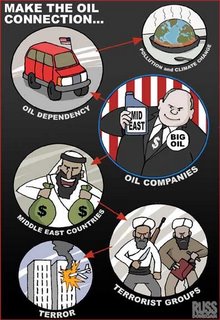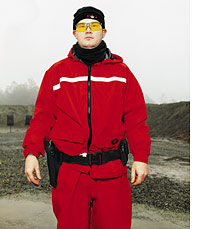Building the Corporate SS (With Taxpayer Money)
 Soldiers of Good Fortune
Soldiers of Good FortuneAt a camp in North Carolina, a private firm called Blackwater USA is training the U.S. Navy to fight terrorists, taking the place of military officers who used to fill such roles.
News: The four Americans horrifically killed on Wednesday by a mob in Fallujah, Iraq, worked for Blackwater USA, a private military company profiled by Barry Yeoman in the May 2003 issue of Mother Jones.
By Barry Yeoman
May/June 2003 Issue
At a remote tactical training camp, in a swamp 25 miles from the world's largest naval base, six U.S. sailors are gearing up for their part in President Bush's war on terrorism. Dressed in camouflage on a January afternoon, they wear protective masks and carry nine-millimeter Berettas that fire nonlethal bullets filled with colored soap. Their mission: recapture a ship -- actually a three-story-high model constructed of gray steel cargo containers -- from armed hijackers.

Indeed, the Bush administration's push to privatize war is swiftly turning the military-industrial complex of old into something even more far-reaching: a complex of military industries that do everything but fire weapons. For-profit military companies now enjoy an estimated $100 billion in business worldwide each year, with much of the money going to Fortune 500 firms like Halliburton, DynCorp, Lockheed Martin, and Raytheon. Secretary of the Army Thomas White, a former vice chairman of Enron, "has really put a mark on the wall for getting government employees out of certain functions in the military," says retired Colonel Tom Sweeney, professor of strategic logistics at the U.S. Army War College. "It allows you to focus your manpower on the battlefield kinds of missions."
Private military companies, for their part, are focusing much of their manpower on Capitol Hill. Many are staffed with retired military officers who are well connected at the Pentagon -- putting them in a prime position to influence government policy and drive more business to their firms.

...Because the Geneva Convention expressly bans the use of mercenaries -- individual soldiers of fortune who fight solely for personal gain -- private military companies are careful to distance themselves from any associations with such hired guns. To emphasize their experience and professionalism, many firms maintain websites brimming with colorful PR material; the industry even funds an advocacy group, the International Peace Operations Association, which portrays military firms as more capable and accountable than the Pentagon. "These companies want to run a professional operation," says the group's director, Doug Brooks. "Their incentive is to make money. How do you make money? You make sure you don't screw up."
...
 When the companies do screw up, however, their status as private entities often shields them -- and the government -- from public scrutiny. In 2001, an Alabama-based firm called Aviation Development Corp. that provided reconnaissance for the CIA in South America misidentified an errant plane as possibly belonging to cocaine traffickers. Based on the company's information, the Peruvian air force shot down the aircraft, killing a U.S. missionary and her seven-month-old daughter. Afterward, when members of Congress tried to investigate, the State Department and the CIA refused to provide any information, citing privacy concerns. "We can't talk about it," administration officials told Congress, according to a source familiar with the incident. "It's a private entity. Call the company."
When the companies do screw up, however, their status as private entities often shields them -- and the government -- from public scrutiny. In 2001, an Alabama-based firm called Aviation Development Corp. that provided reconnaissance for the CIA in South America misidentified an errant plane as possibly belonging to cocaine traffickers. Based on the company's information, the Peruvian air force shot down the aircraft, killing a U.S. missionary and her seven-month-old daughter. Afterward, when members of Congress tried to investigate, the State Department and the CIA refused to provide any information, citing privacy concerns. "We can't talk about it," administration officials told Congress, according to a source familiar with the incident. "It's a private entity. Call the company."
...
The lack of oversight alarms some members of Congress. "Under a shroud of secrecy, the United States is carrying out military missions with people who don't have the same level of accountability," says Rep. Jan Schakowsky (D-Ill.), a leading congressional critic of privatized war. "We have individuals who are not obligated to follow orders or follow the Military Code of Conduct. Their main obligation is to their employer, not to their country."
...
President Bush only has to look to his father's war to see what the consequences of this trend could be in a second conflict with Iraq. In the Gulf War's single deadliest incident, an Iraqi missile hit a barracks far from the front, killing 28 Army reservists who were responsible for purifying drinking water. Other troops quickly jumped in to take their place. "Today, the military relies heavily on contractors for this support," Colonel Steven Zamparelli, a career contracting officer, notes in the Air Force Journal of Logistics. "If death becomes a real threat, there is no doubt that some contractors will exercise their legal rights to get out of the theater. Not so many years ago, that may have simply meant no hot food or reduced morale and welfare activity. Today, it could mean the only people a field commander has to accomplish a critical ‘core competency' task such as weapons-system maintenance…have left and gone home."
...
Gee I wonder what George's contingency plan might be in the event the contracted mercenaries decide to pack it in and go home?


0 Comments:
Post a Comment
<< Home